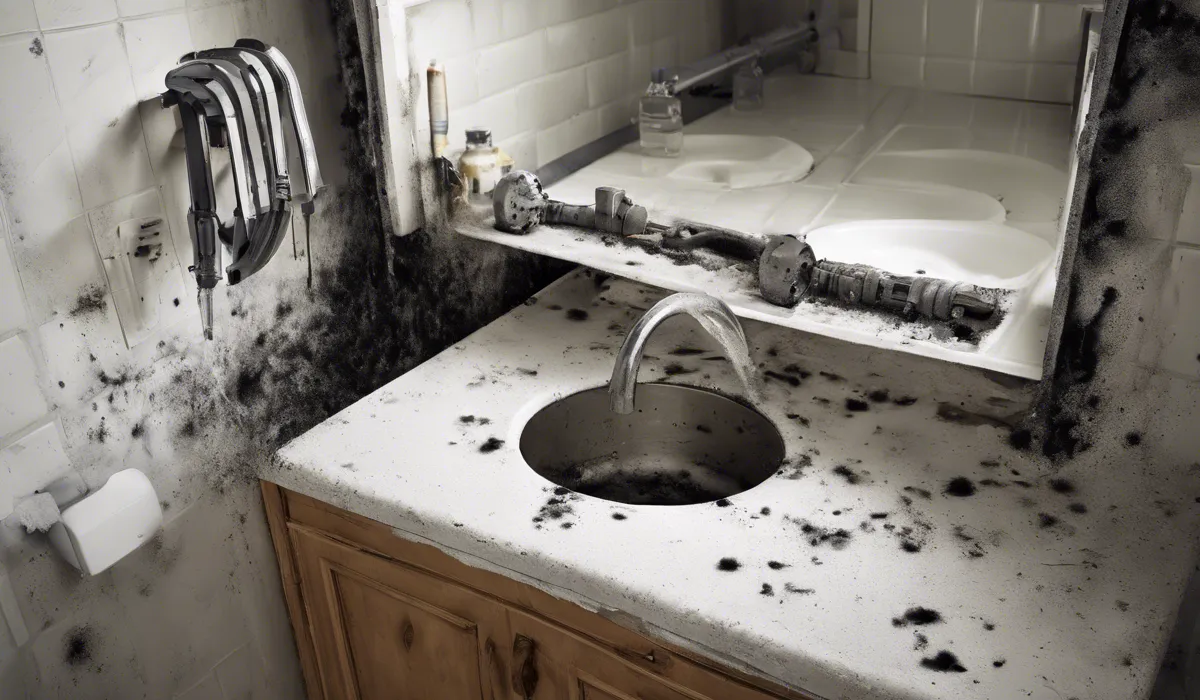Yes, black mold under a sink is dangerous as it can release harmful spores into the air. These spores can cause respiratory issues and allergic reactions. It’s important to remove mold promptly and fix any leaks to prevent its growth.
Understanding Black Mold and Its Habitats

Definition of Black Mold
Black mold, known scientifically as Stachybotrys chartarum, is a type of fungus that can become a problem in homes.
It appears as dark green or black patches and can feel slimy when wet. This mold is not just unsightly; it can also be a health hazard.
Optimal Conditions for Black Mold Growth
For black mold to grow, it needs moisture and something to feed on. Poor ventilation often makes the problem worse by trapping damp air. Places that are often wet, like under sinks, are perfect spots for this mold to live.
Black Mold’s Favorite Foods
Black mold enjoys dining on materials like wood, drywall, and carpet. These materials are often found in parts of homes that can get wet, providing the food source this mold needs to thrive.
Common Black Mold Hideouts in the Home
Most often, black mold is found under sinks due to leaky pipes or high humidity levels. But it can also grow in other damp places, like basements or bathrooms that don’t have good airflow.
Health Risks Associated with Black Mold Exposure

Immediate Health Effects from Black Mold
When you breathe in black mold spores, you might start coughing or have a hard time breathing. Some people get allergies, like sneezing and a runny nose. Your eyes, nose, or throat might feel irritated, too.
Long-Term Health Concerns
Being around black mold for a long time can be even worse for your health. The toxins it makes, called mycotoxins, can be harmful, and scientists are trying to figure out if they can lead to more serious illnesses over time.
Who Is at Risk?
People who already have breathing problems, like asthma, or allergies may get sicker from black mold. If someone’s body has a hard time fighting off germs, or if they are very young or old, they also need to be careful.
Prevention and Remediation Strategies

Stopping Mold Before It Starts
Keeping your home dry and clean is the best way to stop mold from growing. Checking pipes under sinks and making sure your home has good airflow can help a lot.
Materials That Don’t Like Mold
Some building materials are made to resist mold. Using these materials, especially in places like bathrooms or kitchens, can help keep mold away.
When to Clean Mold Yourself?
If you find a small spot of mold, you might be able to clean it up yourself with the right cleaners and by wearing protective gloves and a mask. But if the mold is all over, it’s safer to call someone who knows how to get rid of it without spreading it more.
Getting Rid of Mold for Good
After cleaning up the mold, it’s important to fix any leaks and keep the area dry. This makes sure the mold doesn’t come back. Sometimes, parts of the wall or floor might need to be replaced to get rid of all the mold.
FAQs About Black Mold Under Sink Danger
Is black mold under a sink hazardous to health?
Yes, black mold under a sink is hazardous as it can release spores that may cause respiratory problems and allergic reactions.
Can breathing in spores from black mold under a sink make you sick?
Yes, inhaling spores from black mold can lead to sickness, particularly in individuals with mold sensitivities or compromised immune systems.
What are the symptoms of exposure to black mold under a sink?
Symptoms of black mold exposure can include coughing, sneezing, sore throat, skin irritation, and in severe cases, respiratory infections.
Should I remove black mold under the sink myself?
Small areas of mold can often be handled by the homeowner with proper safety gear and cleaning agents, but extensive mold should be removed by professionals.
How can I prevent black mold from growing under my sink?
Prevent black mold by fixing leaks promptly, ensuring adequate ventilation, and keeping the area under the sink dry and clean.
Final Thoughts
Black mold found under a sink is indeed hazardous, as it emits spores that can adversely affect respiratory health and trigger allergic reactions.
Prompt remediation of mold infestations and addressing any underlying moisture issues, such as leaks, are critical to maintaining a safe and healthy living environment.
